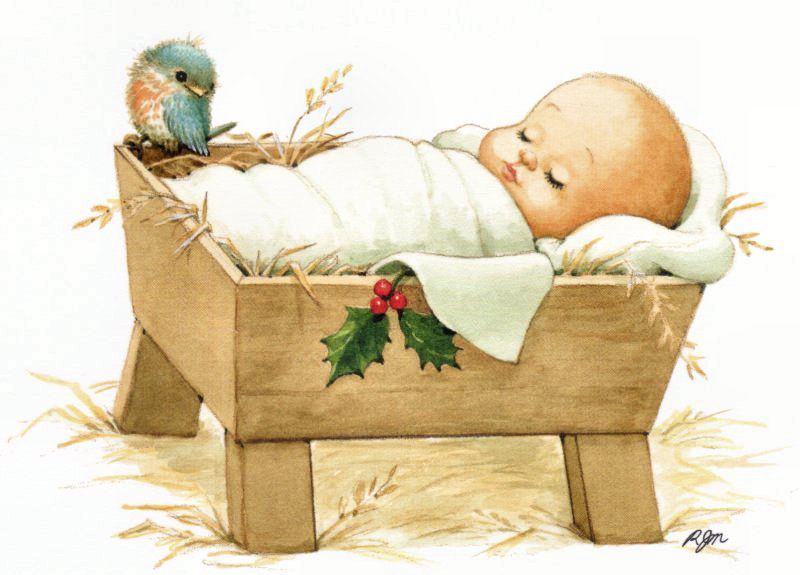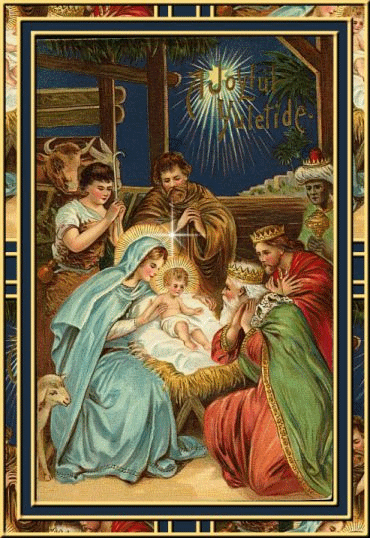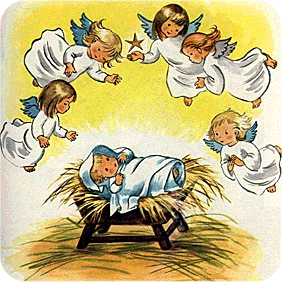Source(Google.com.pk)
Baby Jesus In The Manger Biography
The first point to make is that we have fairly exhaustive records of the censuses conducted by the Roman Empire (who have no record of the census mentioned in Luke), and one of the things we do know conclusively is that the first Universal census - that is, of the entire Roman world - was not conducted until 74 A.D. by Vespasian and Titus. We also know of no censuses in the Roman Empire that required its populace to shuffle around from town to town in order to be counted, which would have resulted in a bureaucratic nightmare, and been pointless besides. If you want to know how many people are standing in a line, what difference does it make in what order they arrange themselves?
That's not to say that Luke is making up a census, simply that he may have attributed the proclamation of a census to the wrong ruler. There was a census of Judea and Syria in 6 A.D., and this could be the census Luke is referring to. At this point it becomes unavoidable to introduce another glaring historical problem with the Biblical narratives. As mentioned, Luke places the birth of Jesus within the rule of Quirinius as governor of Syria. Matthew places the birth of Jesus within the reign of King Herod the Great over Judea. The problem is that all the historical records we have - Josephus in particular - place Herod's death in 4 B.C., while noting that Quirinius did not become governor of Syria until 6 A.D. Thus, we have a 10-year gap between their respective rules, while the Bible would have us believe they somehow overlapped. Let's try to get to the bottom of this.
Scholars - Christian and secular alike - are in unanimous agreement that Jesus was not actually born in the year 0 (or 1 A.D.) (Curious in and enough itself when he was the one supposedly responsible for the calendar's division) Both sides have allowed for some leeway of at least a few years (generally 2-3) to either side of the pivotal calendar switch. I will argue in the next part that when there is a discrepancy between Matthew and Luke, Luke should be preferred. When compared to the other Gospel writers, Matthew's parallel stories have a tendency towards the fantastical. Matthew also demonstrates some clear-cut examples of blatant fabrication (which we'll discuss later). The overall sense one gets from Matthew is that he is not recording events as they actually happened, but as he imagines they should have happened.
What weare faced with now is deciding whether we place Jesus' birth within the traditionally accepted window of about 3 B.C. - 3 A.D. - when no known censuses took place, let alone one of the entire Roman world - or moving his birth a few years outside this window to coincide with a very likely census: 6 A.D. It was a traditional practice in the ancient world for a new ruler to hold a census whenever he came into power. This was primarily so he could get a good fix on what he could expect from taxation revenue. As Quirinius came to power in 6 A.D., he followed protocol and ordered such a census, and this could be the one Luke is referring to. Needless to say, the Herod of Matthew has been dead a decade at this point.
So, to summarize our external problems
1. There was no universal census issued by Augustus, as described by Luke
2. There may have been a census in conjunction with Jesus' birth, but it would have been a local one, and outside the traditional window of time allotted for his birth
3. Either Matthew or Luke (or both) have to be wrong about a fundamental element of their story since Herod and Quirinius never ruled at the same time.
(For a more detailed exposition of these problems, please see Richard Carrier's excellent scholarship here: http://www.infidels.org/library/modern/richard_carrier/quirinius.html#WholeWorld)
The Slaughter of the Innocents
There are several compelling reasons to suspect Matthew's Slaughter of the Innocents never happened. The first, I admit, is an Argument From Silence. Let me state for the record that I am well aware that an argument from silence is generally not an acceptable, academic way of logically arguing a point. However!...In certain, rare instances the silence is so great as to cast serious doubt on the validity of the claim. Of the 4 Gospel writers, Matthew is the only one to relate this barbaric tale, and there are zero, zip, zilch, nada references to this event by anyone else ever. This is particularly odd since Josephus chronicled Herod's reign as completely and extensively as possible in Book 18 of Antiquities of the Jews. In it, he made no attempt to whitewash Herod's character, and seemed even to delight in listing Herod's various crimes. He listed, for example, the beheading of John the Baptist, and various other atrocities Herod committed against members of his immediate family. But if Herod had actually ordered the slaughter of hundreds of baby boys, it would've undoubtedly been the most heinous crime of his illustrious/notorious career. For an historian of his era - specifically chronicling his reign - to omit such a fact would be unthinkable if such an event had actually occurred. It would be like a modern historian writing the biography of Hitler and "accidentally" leaving out the part about WWII and the Holocaust. That's a pretty big "oops." If you're an honest historian trying to scoop up dirt on someone and you leave out the dirtiest nugget of all, there's a good chance that "dirty nugget" doesn't really exist. Since Josephus didn't included it in his biography of Herod, why did Matthew insert it into his narrative? I'm so glad you asked.
Literary scholars have identified 22 elements of the "Mythic Hero Archetype" permeating ancient literature. One of the most prevalent of these elements is the Attempt to Kill the Infant Hero by a Jealous Ruler. A few of the more notable heroes of old adhering to this role are Sargon, Moses, Hercules, Perseus, and Romulus and Remus. Matthew knew that if he was going to offer up Jesus as a hero at least on par with his predecessors, he'd have to include the necessary ingredients, including the jealous ruler bit. But Matthew needed Jesus to one-up the others, not just fill the status quo, so he upped the ante. He knew this act was pretty much played out, and the audience would be demanding some new angle. Matthew had the perfect gimmick: sure, the Jesus story had the jealous ruler make an attempt on his life - same ol', same ol' - but in this version, that exact scenario had been prophesied centuries in advance! After the slaughter, Matthew writes, "Then what was said by the prophet Jeremiah was fulfilled:
'A voice was heard in Rama,weeping and great mourning. Rachel weeping for her children and refusing to be comforted because they are no more.'" (2:17,18)
You'll notice that this prophecy has all the ambiguity of a Nostradamus quatrain that Christians are so fond of dismissing as "overly vague." Does this passage say anything about The Messiah, a jealous king, or the slaughter of infants? No. You could argue that a school house fire that claimed the lives of several children fulfilled this "prophecy" equally well. How does Matthew deduce that this passage refers to the events he's describing? I haven't the faintest idea, especially when we realize that this is merely a sentence fragment ripped out of a much larger context that has absolutely nothing to do with Matthew's Slaughter. The full prophecy Matthew is quoting from is the 31st chapter of Jeremiah. For our purposes, I'll only cite verses 11-17:
"For the Lord will ransom Jacob and redeem them from the hand of those stronger than they. They will come and shout for joy on the heights of Zion; They will rejoice in the bounty of the Lord - the grain, the new wine and the oil, the young of the flocks and herds. They will be like a well-watered garden, and they will sorrow no more. Then maidens will dance and be glad, young men and old as well. I will turn their mourning into gladness; I will give them comfort and joy instead of sorrow. I will satisfy the priests with abundance, and the people will be filled with my bounty," declares the Lord. This is what the Lord says, "A voice was heard in Ramah, mourning and great weeping, Rachel weeping for her children and refusing to be comforted because they are no more." This is what the Lord says, "Restrain your voice from weeping and your eyes from tears, for your work will be rewarded," declares the Lord. "They will return from the land of the enemy. So there is hope for your future," declares the Lord."Your children will return to their own land.
This passage needs to be put in its historical context to be properly understood. At the time Jeremiah utters this prophecy, the Israelites are slaves in captivity to the Babylonians. Jeremiah is simply predicting that they will be returning home at some point. You'll notice the passage Matthew...um..."borrows" as his prophecy concerning weeping and tears; he imagines this applies to the anguish mothers and fathers must be experiencing over their recently deceased sons. But the very next line has God saying, "Stop crying. Dry your tears. The children you're mourning after are coming back home from the land of the enemy!" This is a prophecy for a national homecoming in the very near future, not a random and local slaughter centuries later! Where in the world in that passage is a prediction calling for a jealous ruler to butcher a hundred baby boys? Matthew is grasping at straws to help prop up his imaginative, though unoriginal story. What it boils down to is that Matthew - the only writer in history to ever recount this Slaughter - did so explicitly "to fulfill a prophecy" which called for no such thing in the first place.
We've seen that the 2 Nativity stories are mutually, internally contradictory. We've shown how elements of both tales contradict external documented history, and how one writer is forced to mangle ancient Jewish homecoming predictions to support his wild story-telling. In the next part I will show how none of Matthew's alleged Nativity-related "prophecies" are anything of the sort. Feliz navidad.
Baby Jesus In The Manger Biography
The first point to make is that we have fairly exhaustive records of the censuses conducted by the Roman Empire (who have no record of the census mentioned in Luke), and one of the things we do know conclusively is that the first Universal census - that is, of the entire Roman world - was not conducted until 74 A.D. by Vespasian and Titus. We also know of no censuses in the Roman Empire that required its populace to shuffle around from town to town in order to be counted, which would have resulted in a bureaucratic nightmare, and been pointless besides. If you want to know how many people are standing in a line, what difference does it make in what order they arrange themselves?
That's not to say that Luke is making up a census, simply that he may have attributed the proclamation of a census to the wrong ruler. There was a census of Judea and Syria in 6 A.D., and this could be the census Luke is referring to. At this point it becomes unavoidable to introduce another glaring historical problem with the Biblical narratives. As mentioned, Luke places the birth of Jesus within the rule of Quirinius as governor of Syria. Matthew places the birth of Jesus within the reign of King Herod the Great over Judea. The problem is that all the historical records we have - Josephus in particular - place Herod's death in 4 B.C., while noting that Quirinius did not become governor of Syria until 6 A.D. Thus, we have a 10-year gap between their respective rules, while the Bible would have us believe they somehow overlapped. Let's try to get to the bottom of this.
Scholars - Christian and secular alike - are in unanimous agreement that Jesus was not actually born in the year 0 (or 1 A.D.) (Curious in and enough itself when he was the one supposedly responsible for the calendar's division) Both sides have allowed for some leeway of at least a few years (generally 2-3) to either side of the pivotal calendar switch. I will argue in the next part that when there is a discrepancy between Matthew and Luke, Luke should be preferred. When compared to the other Gospel writers, Matthew's parallel stories have a tendency towards the fantastical. Matthew also demonstrates some clear-cut examples of blatant fabrication (which we'll discuss later). The overall sense one gets from Matthew is that he is not recording events as they actually happened, but as he imagines they should have happened.
What weare faced with now is deciding whether we place Jesus' birth within the traditionally accepted window of about 3 B.C. - 3 A.D. - when no known censuses took place, let alone one of the entire Roman world - or moving his birth a few years outside this window to coincide with a very likely census: 6 A.D. It was a traditional practice in the ancient world for a new ruler to hold a census whenever he came into power. This was primarily so he could get a good fix on what he could expect from taxation revenue. As Quirinius came to power in 6 A.D., he followed protocol and ordered such a census, and this could be the one Luke is referring to. Needless to say, the Herod of Matthew has been dead a decade at this point.
So, to summarize our external problems
1. There was no universal census issued by Augustus, as described by Luke
2. There may have been a census in conjunction with Jesus' birth, but it would have been a local one, and outside the traditional window of time allotted for his birth
3. Either Matthew or Luke (or both) have to be wrong about a fundamental element of their story since Herod and Quirinius never ruled at the same time.
(For a more detailed exposition of these problems, please see Richard Carrier's excellent scholarship here: http://www.infidels.org/library/modern/richard_carrier/quirinius.html#WholeWorld)
The Slaughter of the Innocents
There are several compelling reasons to suspect Matthew's Slaughter of the Innocents never happened. The first, I admit, is an Argument From Silence. Let me state for the record that I am well aware that an argument from silence is generally not an acceptable, academic way of logically arguing a point. However!...In certain, rare instances the silence is so great as to cast serious doubt on the validity of the claim. Of the 4 Gospel writers, Matthew is the only one to relate this barbaric tale, and there are zero, zip, zilch, nada references to this event by anyone else ever. This is particularly odd since Josephus chronicled Herod's reign as completely and extensively as possible in Book 18 of Antiquities of the Jews. In it, he made no attempt to whitewash Herod's character, and seemed even to delight in listing Herod's various crimes. He listed, for example, the beheading of John the Baptist, and various other atrocities Herod committed against members of his immediate family. But if Herod had actually ordered the slaughter of hundreds of baby boys, it would've undoubtedly been the most heinous crime of his illustrious/notorious career. For an historian of his era - specifically chronicling his reign - to omit such a fact would be unthinkable if such an event had actually occurred. It would be like a modern historian writing the biography of Hitler and "accidentally" leaving out the part about WWII and the Holocaust. That's a pretty big "oops." If you're an honest historian trying to scoop up dirt on someone and you leave out the dirtiest nugget of all, there's a good chance that "dirty nugget" doesn't really exist. Since Josephus didn't included it in his biography of Herod, why did Matthew insert it into his narrative? I'm so glad you asked.
Literary scholars have identified 22 elements of the "Mythic Hero Archetype" permeating ancient literature. One of the most prevalent of these elements is the Attempt to Kill the Infant Hero by a Jealous Ruler. A few of the more notable heroes of old adhering to this role are Sargon, Moses, Hercules, Perseus, and Romulus and Remus. Matthew knew that if he was going to offer up Jesus as a hero at least on par with his predecessors, he'd have to include the necessary ingredients, including the jealous ruler bit. But Matthew needed Jesus to one-up the others, not just fill the status quo, so he upped the ante. He knew this act was pretty much played out, and the audience would be demanding some new angle. Matthew had the perfect gimmick: sure, the Jesus story had the jealous ruler make an attempt on his life - same ol', same ol' - but in this version, that exact scenario had been prophesied centuries in advance! After the slaughter, Matthew writes, "Then what was said by the prophet Jeremiah was fulfilled:
'A voice was heard in Rama,weeping and great mourning. Rachel weeping for her children and refusing to be comforted because they are no more.'" (2:17,18)
You'll notice that this prophecy has all the ambiguity of a Nostradamus quatrain that Christians are so fond of dismissing as "overly vague." Does this passage say anything about The Messiah, a jealous king, or the slaughter of infants? No. You could argue that a school house fire that claimed the lives of several children fulfilled this "prophecy" equally well. How does Matthew deduce that this passage refers to the events he's describing? I haven't the faintest idea, especially when we realize that this is merely a sentence fragment ripped out of a much larger context that has absolutely nothing to do with Matthew's Slaughter. The full prophecy Matthew is quoting from is the 31st chapter of Jeremiah. For our purposes, I'll only cite verses 11-17:
"For the Lord will ransom Jacob and redeem them from the hand of those stronger than they. They will come and shout for joy on the heights of Zion; They will rejoice in the bounty of the Lord - the grain, the new wine and the oil, the young of the flocks and herds. They will be like a well-watered garden, and they will sorrow no more. Then maidens will dance and be glad, young men and old as well. I will turn their mourning into gladness; I will give them comfort and joy instead of sorrow. I will satisfy the priests with abundance, and the people will be filled with my bounty," declares the Lord. This is what the Lord says, "A voice was heard in Ramah, mourning and great weeping, Rachel weeping for her children and refusing to be comforted because they are no more." This is what the Lord says, "Restrain your voice from weeping and your eyes from tears, for your work will be rewarded," declares the Lord. "They will return from the land of the enemy. So there is hope for your future," declares the Lord."Your children will return to their own land.
This passage needs to be put in its historical context to be properly understood. At the time Jeremiah utters this prophecy, the Israelites are slaves in captivity to the Babylonians. Jeremiah is simply predicting that they will be returning home at some point. You'll notice the passage Matthew...um..."borrows" as his prophecy concerning weeping and tears; he imagines this applies to the anguish mothers and fathers must be experiencing over their recently deceased sons. But the very next line has God saying, "Stop crying. Dry your tears. The children you're mourning after are coming back home from the land of the enemy!" This is a prophecy for a national homecoming in the very near future, not a random and local slaughter centuries later! Where in the world in that passage is a prediction calling for a jealous ruler to butcher a hundred baby boys? Matthew is grasping at straws to help prop up his imaginative, though unoriginal story. What it boils down to is that Matthew - the only writer in history to ever recount this Slaughter - did so explicitly "to fulfill a prophecy" which called for no such thing in the first place.
We've seen that the 2 Nativity stories are mutually, internally contradictory. We've shown how elements of both tales contradict external documented history, and how one writer is forced to mangle ancient Jewish homecoming predictions to support his wild story-telling. In the next part I will show how none of Matthew's alleged Nativity-related "prophecies" are anything of the sort. Feliz navidad.
Baby Jesus In The Manger


Baby Jesus In The Manger


Baby Jesus In The Manger


Baby Jesus In The Manger


Baby Jesus In The Manger


Baby Jesus In The Manger


Baby Jesus In The Manger


Baby Jesus In The Manger




No comments:
Post a Comment